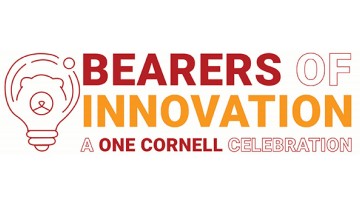Cornell Hosts Celebration for Inventors Across Campuses
Imagine a world where advanced cancer treatments are not just a possibility but reality, sustainable agriculture feeds the world and digital solutions safeguard public health. An event coinciding with National Inventors Month showcased early discoveries and innovations by Cornellians that could help reach these goals.
At “Bearers of Innovation: A One Cornell Celebration,” the Center for Technology Licensing at Cornell University recognized researchers’ milestones in the intellectual property and commercialization process. In total, 105 Cornellians invented technologies that were licensed or optioned to industry partners during fiscal year 2023, and 54 lead inventors disclosed a technology for the first time during the same fiscal year.
The May 9 event – named for the One Cornell presidential priority to develop opportunities that build on the complementary strengths of the university’s rural and urban campuses – took place simultaneously at the Statler Ballroom in Ithaca and the Griffis Faculty Club at Weill Cornell Medicine in New York City.
Alice Li, Ph.D. ’98, executive director of CTL, turned the spotlight on Cornell faculty, research staff and graduate students who are advancing knowledge and working to transform the world for the better. “Today is the celebration of inventors like you, who have reached milestones in your journey of technology commercialization and new ventures to realize research impact for societal benefits,” Li said as she opened the event. “Today is also the time we embrace new inventors who just started on this meaningful path. We hope to expand the base for innovation so more of you can join, with increasing inclusivity.”
Lisa Placanica, senior managing director of CTL at Weill Cornell Medicine, emphasized the importance of innovation and commercialization in improving the quality of life across the globe. “These innovators are leading not only with their research but also with their commitment to Purposeful Discovery and with support and mentorship of diverse teams within their labs, expanding the community of inventors for the greatest impact of lasting contributions to society,” she said.
Innovators recognized at the event are pursuing high-impact solutions and goals with transformative potential for people and communities, including improving the safety and efficiency of self-driving cars, designing new pumps for heart surgeries, enhancing communication technology with light-based circuits, creating smart fabrics that boost plant growth, developing new cancers treatments and much more.
Cornell alum Robert S. Langer ’70, Institute Professor at the Massachusetts Institute of Technology (MIT), delivered the keynote address. Langer holds over 1,000 patents and is celebrated globally for advancements in drug delivery systems and his success in founding new ventures that benefit human health.
Langer used his keynote to share stories about the invention of the first controlled release of macromolecules using biocompatible polymers, and how the technology has transformed drug delivery. Six years after earning his bachelor’s degree in chemical engineering at Cornell, Langer and his collaborators challenged conventional wisdom by demonstrating that tiny particles could deliver large molecules such as enzymes, and that molecules delivered by this method could inhibit blood vessel growth in tumors. In 2004, the biotechnology company Genentech commercialized Avastin, the first blood vessel inhibitor for cancer treatment that used the macromolecule-releasing technology Langer helped to develop. Langer’s patent portfolios were licensed or sublicensed by more than 400 pharmaceutical, chemical, biotech and medical device companies. His work in mRNA delivery was instrumental in the founding of Moderna and contributed to the development of the mRNA vaccine for COVID-19.
According to Langer, innovators must demonstrate resilience in the face of skepticism to bring ideas to fruition. He encouraged Cornell researchers to lead by defying naysayers and persisting in their pursuits. “In spite of that skepticism [we encountered], or maybe because of it, we just kept going,” he said.
“The inventors celebrated as bearers of innovation by CTL exemplify the many ways Cornell nurtures and promotes impactful ideas through interdisciplinary and intercampus dialogue and collaboration,” said Krystyn J. Van Vliet, vice president for research and innovation. “Across Cornell on every campus, every inventor plays a critical part in our vibrant innovation ecosystem, not only by advancing their own research but also by supporting their peers and mentoring the next generation of inventors.”
“Innovation and entrepreneurship spearheaded at Cornell University and Weill Cornell Medicine are critical to advancing commercialization and to driving major milestones in patient care,” said Bob Harrington, the Stephen and Suzanne Weiss Dean at Weill Cornell Medicine. “I am incredibly proud of the inventors and leaders across our campuses who have demonstrated extraordinary commitments to this important work.”

